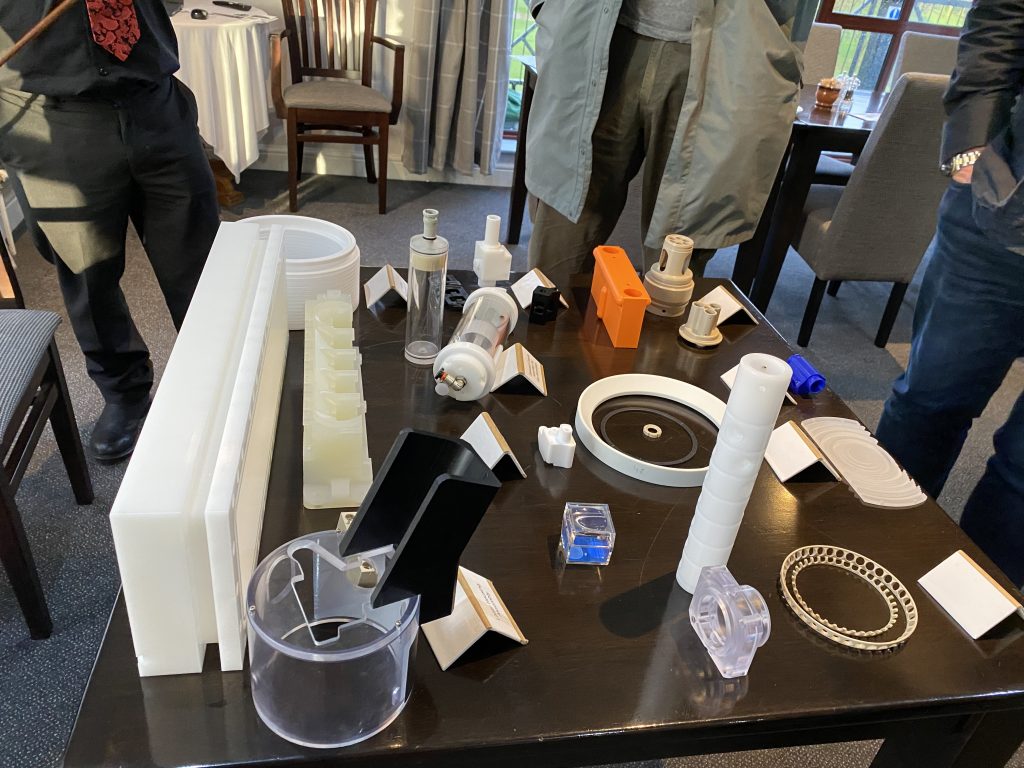REPORT ON MEETING WITH RŐCHLING INDUSTRIAL (UK) LTD
Friday February 18th 2022
with Gary Willshire Operations Manager High Peak, and Robyn Eaton, UK Sales Director.
Storm Eunice was battering the UK as we met; but the waning of Covid gave us grounds for optimism, that maybe things were returning to normal. However.. the following week President Putin invaded Ukraine. The best laid plans of mice and men, eh?
Plastics may seem like an odd product for the Peak District but in fact we have several such companies, the legacy of ICI perhaps. Robyn gave us a brief history. The business in Chapel en le Frith was founded by chemist Dr Keith Bromley over 50 years ago and was known as Fibrecon; it made products for laboratories, seals and gaskets, where rubber would be eaten away. When Keith retired in 1997 he sold to two Dupont employees, and in turn in 2014 it was bought by Röchling and became one of 91 locations all over the world employing 11,000 people. Röchling has its 200th anniversary this year; it was founded in 1822 as a coal trading company by Friedrich Röchling and is still privately owned with HQ in Mannheim. Currently they have two local factories, one in Chapel and one in Whaley, though “We’re bursting at the seams, and we need to expand,” Robyn said.

The main plastic here is a wonder material called PTFE, discovered by accident in 1938. The trademark ‘Teflon’ was registered in the US by Dupont in 1945. It’s a simple strong polymer, full name Poly tetra fluoride ethylene, in which all the hydrogen atoms attached to the carbon chain have been replaced by fluorine (that’s it above). That gives PTFE unique qualities. We all know about its very low coefficient of friction (non-stick pans, anyone?) but it’s also chemically inert and hydrophobic over a wide temperature range from cryogenic up to 260°C. And it’s much lighter than metals, though strong; its applications are very wide ranging.
Since 1997 local operations have expanded into many different kinds of plastics, and most recently, into assembling items for their customers and thus adding value and convenience. “These are high performance plastics,” we were told – “not your single use plastic wrap.” And PTFE tends to be used when nothing else will do the job. Examples included Formula 1 racing cars (where strength and lightness are at a premium), cochlear implants (where the inert qualities and lightness matter) offshore oil and gas extraction, where extreme conditions are a factor; those parts are made in bright orange to assist divers on the sea bed. Planes, space.. “We have parts on their way to Mercury right now.” The range of applications is breathtaking.
During the pandemic our local company made part for ventilators, for a Swedish partner with whom they already had a contract, and equipment for the manufacture of vaccines – “90% of vaccines were made on machines that had our parts in them,” they proudly explained.
On the table (below) were various examples of their craft – at least, what could be packed into the boot of Robyn’s car. Some are so tiny you need a magnifying glass to see them; the largest was for supporting a bridge as traffic rumbled over it.
The Röchling philosophy, to always be in the forefront, is behind all this. An investment strategy is developed every year, which means they can take on work their competitors can’t do. Within the group, Chapel can do things no-one else in the Group can do and thus its future is assured. Indeed, a new 40,000 sq ft purpose-built facility is in development; currently 65 people are employed and they’re looking to grow that number over the next 3 – 5 years. But in response to a question, they admitted that “People are our biggest challenge at all levels” as full employment means it’s difficult to get staff even though “it’s a clean modern factory” and “our wages are competitive.” That’ll mean more automation in future, it’s bound to, in the UK and elsewhere. But the government’s latest apprenticeship scheme might help – “Its beauty is, it’s not restricted by age.”
A discussion followed about waste and disposal of the products, and it was pointed out that this is an inert material which will last for at least 20 years in the machinery and equipment of which it forms a vital part (and disposal is the responsibility of the final owner). Swarf is reused and recycled, but “You only use these materials when nothing else will do,” Robyn pointed out. Metals would use a lot more energy to make and to use, but simply wouldn’t survive in hostile environments. My own feeling is that years from now, when we are looking at shoring up coastal defences against the rise in sea levels, this material, recycled, could be as useful as rock, and a great deal cheaper to transport.
So, another example of a spectacular local company where inward investment has turned exceptional talent into a world-beater. Possibly the local machine operators don’t realise this… but now we do.
